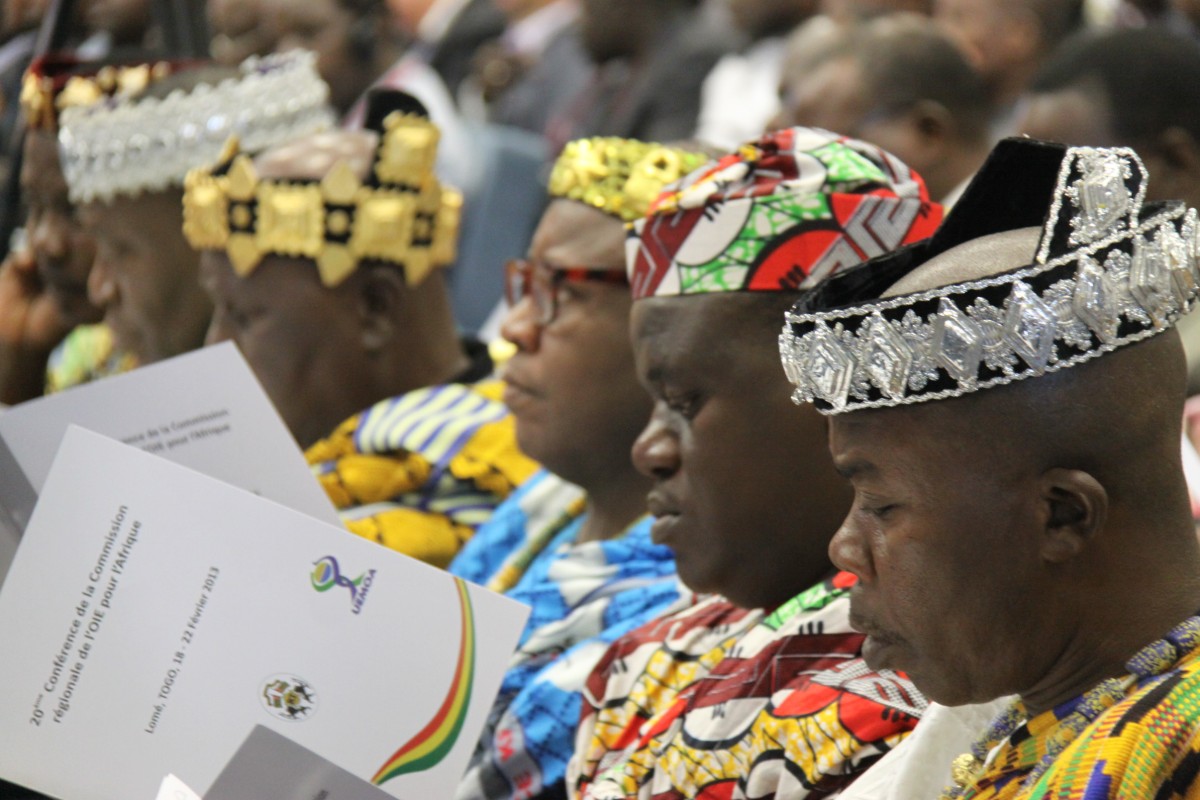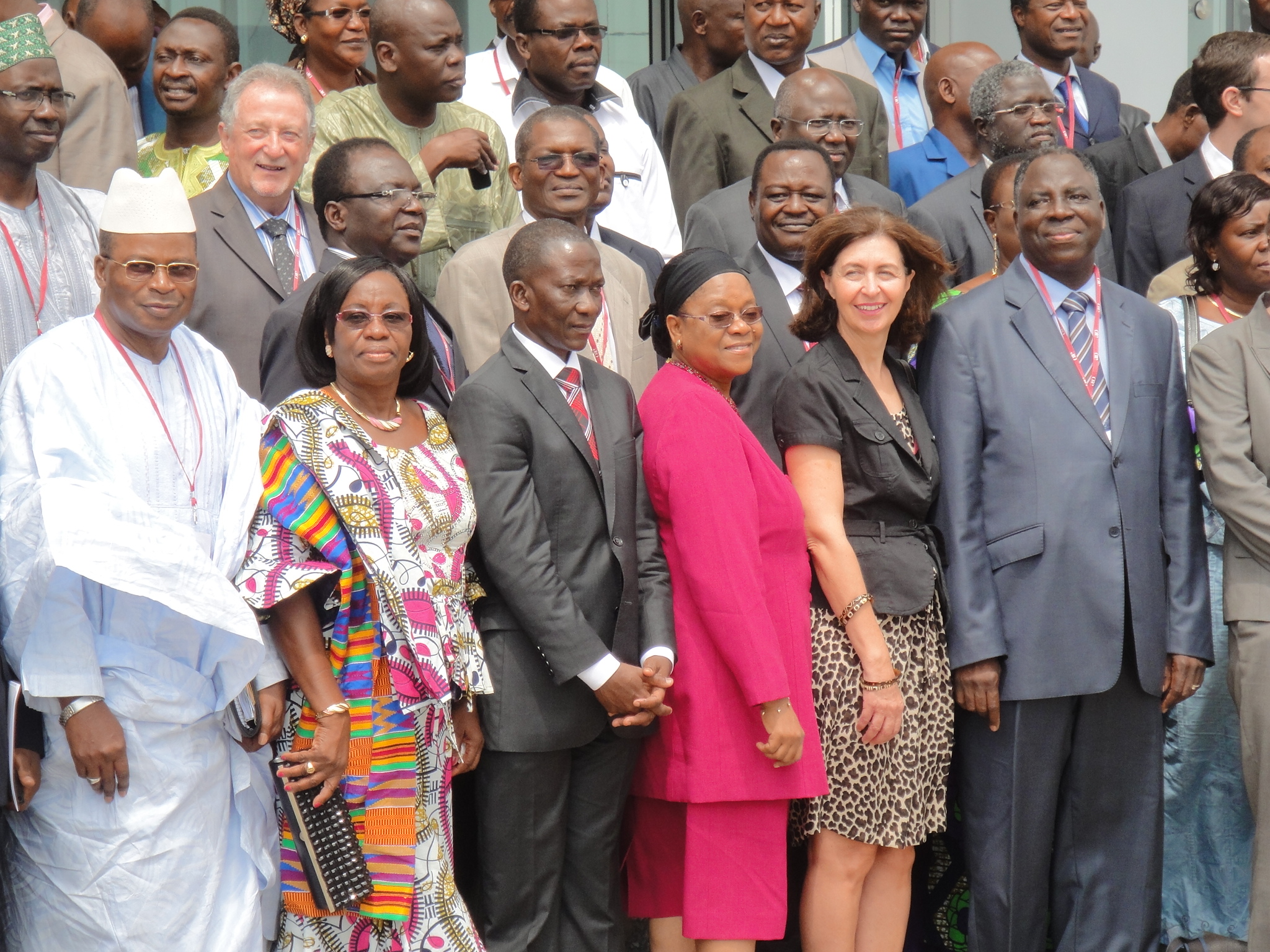
The 20th Conference of the Regional Commission for Africa of the World Organisation for Animal Health (OIE) was held in Lomé (Togo) from 18 to 22 February 2013. The Conference was chaired by Colonel Ouro Kura Agadazi, the Togolese Minister of Agriculture, Livestock and Fisheries (MAEP), along with Dr Bernard Vallat, OIE Director General, Dr. Karin Schwabenbauer, President of the OIE, Dr. Yacouba Samaké, OIE Regional Representative for Africa, Dr. Marosi Molomo, OIE Delegate of the Kingdom of Lesotho and President of the OIE Regional Commission for Africa and Dr. Batassé Komla (Daniel) Batawui, the OIE Delegate of Togo.
For reasons of conflicting dates, the OIE Director-General was represented by Dr Monqiue Eloit, OIE Deputy Director General during the first day of the Conference
The inaugural meeting was held in the Conference Hall of the ECOBANK building under the high patronage of the President of the Republic of Togo, H.E. Faure E. Gnassingbe. The President unfortunately could not make it and was represented by the Togolese Minister of Health, Prof. Dr. Charles Kondi Agba, himself a veterinarian and former lecturer of the EISMV in Dakar (Senegal).
Dr. Karin Schwabenbauer, President of the OIE Council and of the World Assembly of OIE Delegates, elected in May 2012, focused on the four priorities of her tenure, namely the modernisation of the Organisation, transparency in information and procedures, solidarity between the OIE regions and the promotion of the participation of women in the Organisation. As the first-ever woman – President of the OIE, she hosted a reception for the women-Delegates and experts present at the Conference.
Dr Monique Eloit, Deputy Director-General of the OIE delivered a speech in which she clarified – amongst other things – that the past sanitary emergencies have demonstrated that it is impossible to control diseases worldwide without solid alliances between international organisations such as the OIE and the UN, represented by the FAO, but also WHO, a key partner in view of bridging animal health, veterinary public health and human health.
The 26 African countries represented at the Conference were Algeria, Angola, Benin, Burkina Faso, Central African Republic, Chad, Côte d’Ivoire, Guinea, Guinea-Bissau, Kenya, Lesotho, Mali, Morocco, Mozambique, Namibia, Niger, Nigeria,, Rwanda, Senegal, South Africa, Sudan, Tanzania, Togo, Uganda, Zambia and Zimbabwe. Moreover, numerous international and regional organisations and many observers participated in the Conference which was held at the Mercure – Sarakawa Hotel.
Group picture. Picture (c) P. Bastiaensen (oie) 2013.
After the election of the bureau of the Conference and adoption of the agenda, a string of technical presentations were delievered. One will remember the presentation by Dr. Monique Elioit on the medium and long term vision of the Organisation, followed by the presentation by Dr. Yacouba Samaké on the mandate of the OIE in Africa and the presentation by Dr. Patrick Bastiaensen, on behalf of the Terrestrial Animal Health Standards Commission (the Code Commission) on the major changes to the Terrestrial Code since the last Regional Conference of 2011 in Kigali, Rwanda. Also very interesting was the analysis of the animal health situation in Africa by Dr Karim Ben Jebara, Head of the OIE Animal Health Information Department (WAHIS) and on the situation of PPR, presented by Dr. Jemi Domenech, officer in charge of the PPR portfolio within the OIE Scientific and Technical Department in Paris.
The Regional Representation and Sub-Regional Representations of the OIE in Africa presented their progress reports, as well as their plans for the next two years, i.e. Bamako (Mali), Gaborone (Botswana), Tunis (Tunisia) and Nairobi (Kenya).
Shortly after his arrival in Lomé, on Wednesday, the Director-General of the OIE, Dr Bernard Vallat made a presentation on the OIE programme with respect to veterinary education.
Finally, two particularly important technical topics were presented during the Conference on the basis of which recommendations have been adopted:
Regarding the OIE PVS (Performance of Veterinary Services) pathway, two countries presented testimony of the benefits and positive returns the PVS missions have had for the development of the animal health agenda : Togo and Guinea. Furthermore a technical cooperation agreement was signed between Uganda and the OIE for the modernisation of its veterinary legislation.
Towards the end of the second day, several international and regional technical organisations, as well as donors, were given the floor to present their views to the Delegates of the OIE in Africa. As such, statements were delivered by :
As for the first evening, hosted by the Government of Togo, the second day was brought to a close with a gala dinner hosted by the OIE.
Thursday was dedicated for field visits and to the audience granted by the Hon. Prime Minuster and the Hon. President of the Republic of Togo to the Director General and the President of the OIE, accompanied by the OIE Regional Representative for Africa, the Hon. Minister of Agriculture, Livestock and Fisheries and the OIE Delegate for Togo.
The Government of Togo, represented by the two line-Ministers, Agriculture, Livestock and Fisheries on the one hand, and of Health of other hand, have made tremendous efforts to turn this Regional Conference into great success. One must underline the fact that the Hon. Minister of Agriculture, Livestock and Fisheries effectively presided over the working sessions of this Conference. The OIE wishes to thank the authorities and the people of Togo for the warm welcome. The organisation also wishes to acknowledge the West-African Economic and Monetary Union (WAEMU) for its contribution to the Conference budget and support to ensure the participation of the delegations of its Member States.
The next Conference will be held in February 2015 in Morocco. Namibia has expressed interest in hosting the 2017 Conference
All pictures (c) P. Bastiaensen (oie) 2013, except where mentioned otherwise


